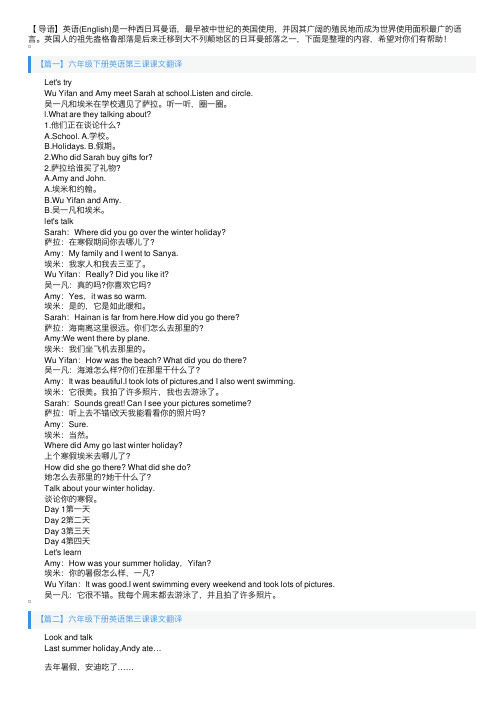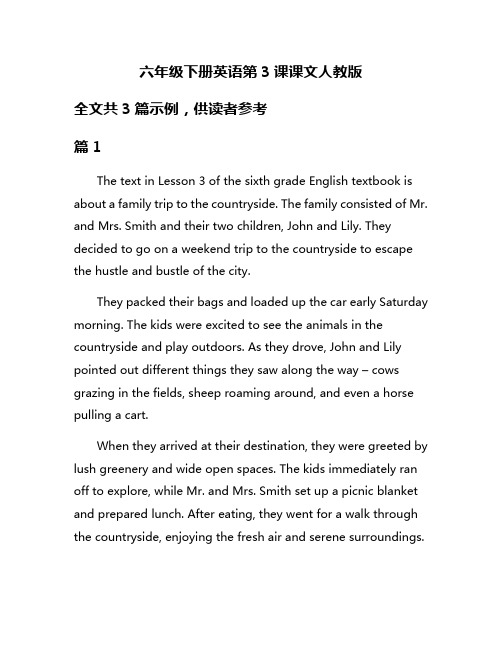六年级英语第三课
六年级下册英语第三课课文翻译及单词

【导语】英语(English)是⼀种西⽇⽿曼语,最早被中世纪的英国使⽤,并因其⼴阔的殖民地⽽成为世界使⽤⾯积最⼴的语⾔。
英国⼈的祖先盎格鲁部落是后来迁移到⼤不列颠地区的⽇⽿曼部落之⼀,下⾯是整理的内容,希望对你们有帮助!【篇⼀】六年级下册英语第三课课⽂翻译 Let's try Wu Yifan and Amy meet Sarah at school.Listen and circle. 吴⼀凡和埃⽶在学校遇见了萨拉。
听⼀听,圈⼀圈。
l.What are they talking about? 1.他们正在谈论什么? A.School. A.学校。
B.Holidays. B.假期。
2.Who did Sarah buy gifts for? 2.萨拉给谁买了礼物? A.Amy and John. A.埃⽶和约翰。
B.Wu Yifan and Amy. B.吴⼀凡和埃⽶。
let's talk Sarah:Where did you go over the winter holiday? 萨拉:在寒假期间你去哪⼉了? Amy:My family and I went to Sanya. 埃⽶:我家⼈和我去三亚了。
Wu Yifan:Really? Did you like it? 吴⼀凡:真的吗?你喜欢它吗? Amy:Yes,it was so warm. 埃⽶:是的,它是如此暖和。
Sarah:Hainan is far from here.How did you go there? 萨拉:海南离这⾥很远。
你们怎么去那⾥的? Amy:We went there by plane. 埃⽶:我们坐飞机去那⾥的。
Wu Yifan:How was the beach? What did you do there? 吴⼀凡:海滩怎么样?你们在那⾥⼲什么了? Amy:It was beautiful.I took lots of pictures,and I also went swimming. 埃⽶:它很美。
六年级上册英语教案-Unit 3 Staying Healthy 第三课时 广东开心英语

六年级上册英语教案-Unit 3 Staying Healthy 第三课时广东开心英语教学内容本课时为广东开心英语六年级上册Unit 3 Staying Healthy的第三课时,主要围绕“健康生活”的主题展开。
教学内容包括词汇学习、句型练习、听力训练、口语表达及健康生活习惯的培养。
学生将通过本课时的学习,了解并掌握如何用英语描述健康的生活方式和表达健康的重要性。
教学目标1. 知识与技能:使学生能够准确运用本课时所学的词汇和句型谈论健康生活,提高听说能力。
2. 过程与方法:通过情境创设、小组合作、任务驱动等教学方法,培养学生自主、合作、探究的学习能力。
3. 情感态度价值观:引导学生树立健康的生活观念,关注自身健康,培养良好的生活习惯。
教学难点1. 正确使用本课时所学的词汇和句型进行口语表达。
2. 听懂并准确获取关键信息,提高听力理解能力。
3. 培养学生运用英语解决实际问题的能力。
教具学具准备1. 教学课件2. 录音机及磁带3. 学生用书及练习册4. 黑板、粉笔5. 小组活动道具(如卡片、图片等)教学过程1. 导入:通过图片、歌曲等形式,复习已学过的与健康生活相关的词汇和句型,为新课的学习做好铺垫。
2. 新课呈现:利用教学课件,展示本课时所学词汇和句型,引导学生观察、模仿、跟读,确保学生正确掌握发音和用法。
3. 情境创设:创设真实的生活场景,让学生运用所学知识进行角色扮演,提高口语表达能力。
4. 小组合作:学生分组进行讨论,分享各自的健康生活经验,培养合作精神和团队意识。
5. 任务驱动:布置任务,让学生运用所学知识完成相关练习,巩固所学内容。
6. 听力训练:播放录音,让学生听懂并准确获取关键信息,提高听力理解能力。
7. 总结与反馈:教师对本课时所学内容进行总结,学生进行自我评价和反馈,教师给予指导和鼓励。
板书设计板书设计应简洁明了,突出本课时所学重点,包括词汇、句型、语法等,方便学生复习和回顾。
作业设计1. 听力练习:完成练习册上的听力题目,提高听力理解能力。
六年级下册英语第3课课文人教版

六年级下册英语第3课课文人教版全文共3篇示例,供读者参考篇1The text in Lesson 3 of the sixth grade English textbook is about a family trip to the countryside. The family consisted of Mr. and Mrs. Smith and their two children, John and Lily. They decided to go on a weekend trip to the countryside to escape the hustle and bustle of the city.They packed their bags and loaded up the car early Saturday morning. The kids were excited to see the animals in the countryside and play outdoors. As they drove, John and Lily pointed out different things they saw along the way – cows grazing in the fields, sheep roaming around, and even a horse pulling a cart.When they arrived at their destination, they were greeted by lush greenery and wide open spaces. The kids immediately ran off to explore, while Mr. and Mrs. Smith set up a picnic blanket and prepared lunch. After eating, they went for a walk through the countryside, enjoying the fresh air and serene surroundings.As the day drew to a close, they made their way back to the car and drove home, all feeling happy and content after a day spent in nature. The family agreed that they would definitely come back to the countryside for another visit soon.Overall, the text highlights the importance of spending time in nature and taking a break from the hustle and bustle of everyday life. It is a reminder to appreciate the simple things in life and enjoy the beauty of the natural world.篇2The sixth grade textbook of the People's Education Press contains a variety of interesting and educational lessons that help students improve their English language skills. In this article, we will specifically focus on Lesson 3 of the sixth grade second semester textbook.Lesson 3 begins with a dialogue between two students, Amy and Peter, discussing their favorite hobbies. The students use a range of vocabulary related to hobbies and activities, such as reading, playing sports, and drawing. This dialogue serves as a useful example for students to learn how to talk about their own hobbies and interests in English.After the dialogue, the lesson introduces new vocabulary words related to hobbies, such as "jogging," "gardening," and "cooking." Students are encouraged to practice using these words in sentences and to think about their own hobbies and interests that they can discuss in English.The lesson also includes a reading passage about different students and their hobbies. This passage provides students with examples of how to talk about hobbies in more detail, such as why they enjoy a certain activity or how often they do it. Students are encouraged to read the passage aloud in class and discuss the various hobbies mentioned.In addition to the dialogue and reading passage, Lesson 3 also includes a listening exercise where students listen to a recording of someone talking about their hobbies and answer comprehension questions based on the audio. This exercise helps students improve their listening skills and ability to understand spoken English.Overall, Lesson 3 of the sixth grade textbook is a comprehensive and engaging lesson that helps students learn how to talk about their hobbies and interests in English. By practicing the dialogue, vocabulary words, reading passage, and listening exercise, students can improve their English languageskills and become more confident in using English to communicate about their own hobbies and interests.篇3I apologize for the misunderstanding. Here is a document based on the 3rd lesson in the 6th Grade English textbook, People's Education Press.Title: A Day at the ZooIt was a bright and sunny day when our class went on a field trip to the zoo. We were all excited to see the various animals and learn more about them.As soon as we arrived, we split into small groups and started exploring the different enclosures. The first animals we saw were the majestic lions. They were resting lazily in the shade, their golden coats shining in the sunlight. We were amazed at how powerful they looked.Next, we headed to the elephant enclosure. The elephants were playing with each other, using their trunks to grab leaves and branches. It was incredible to see how intelligent and gentle these creatures were.We also saw giraffes, zebras, and monkeys swinging from tree to tree. The monkeys were particularly entertaining, chattering and jumping around with so much energy.After exploring all the animal enclosures, we gathered for a picnic lunch by the lake. It was a beautiful spot with ducks swimming in the water and peacocks strutting around. We felt like we were in a paradise surrounded by nature's beauty.Before leaving the zoo, we visited the gift shop and bought souvenirs to remember this wonderful day. As we boarded the bus back to school, we were all chatting excitedly about our favorite animals and moments at the zoo.Overall, our trip to the zoo was an educational and memorable experience. We learned so much about wildlife and conservation, and it was a day we would never forget.。
六年级英语上册素材-Lesson 3 It will be sunny this Sunday课文翻译 科普版

Lesson 3 It will be sunny this Sunday第三课这个星期天会是晴天单词表cloudy ['klaudi] 多云的windy ['windi] 有风的place [pleis] 地方strong [strɔŋ] 强壮的,强烈的rain [rein] 雨;下雨lake [leik] 湖earth [ə:θ] 地球change [tʃeindʒ] 改变wind [wind] 风dry [drai] 干的full [ful] 满的bring about 带来,引来be bad for 对……有害full of 充满课文翻译Let’s talk让我们谈谈(D=dongdong, L=Lulu)(D =东东,L =露露)D: It’s nice outside, isn’t it?外面天气很好,不是吗?L: Yes, it is.是的。
D: What will the weather be like tomorrow?明天天气会怎么样?L: It will be cloudy and windy.将会多云而且有风。
D: Will it be cold?天气会冷吗?L: Yes, it will. But it’ll be sunny this Sunday.是的,会的。
但是这个星期天会是晴天。
D: That’s good. I think it’ll be warm, too.那很好。
我想天气也会暖和的。
L: Yes, I think so.是的,我想是的。
D: What are you going to do this Sunday?这个星期天你打算做什么?L: I’m going to see my grandpa. And you?我要去看我爷爷。
你呢?D: I’m going to play football.我打算去踢足球。
Listen and say听和说(L=Lili, J=John)(莉莉,约翰)L: Hi, John! The winter holiday is coming. What are you going to do?你好,约翰!寒假就要到了。
六年级英语上册unit3主要知识点

六年级英语上册unit3主要知识点Unit 3 My weekend plan一、主要单词:this morning今天上午this afternoon今天下午this evening 今天晚上next week下周tomorrow 明天tonight 今晚see a film看电影take a trip去旅行draw some pictures画画visit my grandparents拜访我的祖父母go to the supermarket去超市post card 明信片comic book漫画书word book单词书二、主要句子:What are you going to do tomorrow?你明天打算做什么?I’m going to have an art lesson.明天我要上美术课。
We’re going to draw some pictures in Renmin Park.我们要到人民公园去画画。
Where are you going? 你们打算去哪里?We’re going to the cinema.我们打算去电影院。
When are you going?你们什么时候去?What are you going to buy?你打算去买什么?I’m going to buy a comic book。
我打算去买一本漫画书。
三、知识点:1、I用am,you用are,is连着he/she/it;单数名词用is,复数名词用are2、What are you going to do?你想做什么?询问他人在未来的打算。
3、be going to + 动词的原形如:I’m going to see a film tomorrow.4、this evening 和tonight的区别:this evening指的是今天晚上睡觉以前的时间,一般指晚上十二点以前。
tonight指的是今晚,一般是指一整晚的时间,通宵。
六年级上册第三课的笔记

六年级上册第三课的笔记本节课内容主要涉及英语语法中的动词时态和词性转换。
通过学习本课,我们将了解英语中常用的动词时态形式以及如何将动词从一种时态转换为另一种时态。
一、动词时态1. 现在时态现在时态表示目前正在进行的动作或习惯性的动作。
它有简单现在时、现在进行时和现在完成时三种形式。
- 简单现在时:表示经常或习惯性发生的动作。
例如:I eat an apple every day.(我每天吃一个苹果)- 现在进行时:表示正在进行的动作。
例如:I am playing football now.(我正在踢足球)- 现在完成时:表示过去某个时间发生的动作对现在的影响。
例如:She has finished her homework.(她已经完成了作业)2. 过去时态过去时态表示发生在过去的动作或状态。
它有一般过去时和过去进行时两种形式。
- 一般过去时:表示在过去某个特定时间发生的动作。
例如:He went to the park yesterday.(他昨天去了公园)- 过去进行时:表示在过去某个时间正在进行的动作。
例如:They were playing basketball at 8 o'clock yesterday evening.(昨天晚上8点他们正在打篮球)3. 将来时态将来时态表示将要发生的动作或存在的状态。
它有简单将来时和将来进行时两种形式。
- 简单将来时:表示将来某个时间即将发生的动作。
例如:We will have a party next week.(下周我们将举办派对)- 将来进行时:表示将来某个时间正在进行的动作。
例如:She will be studying at the library tomorrow morning.(明天早上她将在图书馆学习)二、词性转换1. 名词转换为动词通过在名词前加上适当的动词变化形式,我们可以将名词转换为动词。
- 例如:friend(名词,朋友)→ befriend(动词,与某人交朋友)2. 形容词转换为副词通过在形容词后面加上-ly,我们可以将形容词转换为副词。
六年级英语第三课单词

六年级英语第三课单词由于不清楚你所说的六年级英语是上册还是下册,以下为人教版六年级英语上册第三课单词:一、单词。
1. postcard.- 英标:[ˈpəʊstkɑːd]- 词性:n.(名词)2. more.- 英标:[mɔː(r)]- 词性:m(many或much的比较级,形容词或副词)3. restaurant.- 英标:[ˈrestrɒnt]- 词性:n.(名词)4. dumpling.- 英标:[ˈdʌmplɪŋ]- 词性:n.(名词)5. tonight.- 英标:[təˈnaɪt]- 词性:n.(名词)/adv.(副词)- 英标:[stæmp]- 词性:n.(名词)/v.(动词)7. bookstore.- 英标:[ˈbʊkstɔː(r)]- 词性:n.(名词)8. cinema.- 英标:[ˈsɪnəmə]- 词性:n.(名词)如果是人教版六年级英语下册第三课单词:一、单词。
1. ate.- 英标:[et]- 词性:v.(动词,eat的过去式)2. took.- 英标:[tʊk]- 词性:v.(动词,take的过去式)3. bought.- 英标:[bɔːt]- 词性:v.(动词,buy的过去式)- 英标:[ɡɪft]- 词性:n.(名词)5. fell.- 英标:[fel]- 词性:v.(动词,fall的过去式)6. off.- 英标:[ɒf]- 词性:prep.(介词)7. Labour Day.- 英标:[ˈleɪbə(r) deɪ]- 词性:n.(名词)8. mule.- 英标:[mjuːl]- 词性:n.(名词)9. Turpan.- 英标:[tʊəˈpɑːn]- 词性:n.(名词)10. could.- 英标:[kʊd]- 词性:v.(动词,can的过去式)11. till.- 英标:[tɪl]- 词性:conj.(连词)/prep.(介词)。
六年级上册英语教案-Unit 3《Would you like to come to my birt

六年级上册英语教案-Unit 3《Would you like to come to my birthday party》(Lesson 13)|人教(精通)教学内容本课为人教版六年级上册英语《精通》Unit 3《Would you like to come to my birthday party》的第13课。
教学内容围绕生日聚会的邀请和应答进行,包括如何礼貌地发出邀请,接受或婉转拒绝邀请,以及讨论生日聚会的相关活动。
教学目标1. 能听懂、会说、会读本课的关键句型:“Would you like to...?”、“Yes, I'd love to./Sorry, I can't.”。
2. 能运用所学句型在真实情境中发出邀请和应答邀请。
3. 培养学生的社交礼仪意识,学会在交流中体现礼貌和尊重。
4. 增强学生的合作学习能力,通过小组活动提高英语口语实践能力。
教学难点1. 正确运用不同的回答方式表达接受或婉转拒绝邀请。
2. 学生对于第三人称单数的正确使用。
3. 引导学生理解中西方在生日聚会习俗上的文化差异。
教具学具准备1. 多媒体教学设备,用于播放课件和视频。
2. 课文挂图,用于辅助讲解和练习。
3. 生词卡片,用于复习和巩固。
4. 小组活动记录表,用于记录学生小组讨论情况。
教学过程1. 导入:通过播放一段生日聚会的视频,激发学生的兴趣,并引出本课主题。
2. 新授:讲解关键句型,通过示例和角色扮演让学生理解并练习如何发出邀请和应答邀请。
3. 实践:学生分组进行角色扮演活动,模拟生日聚会的邀请场景,教师巡回指导。
4. 巩固:通过课堂游戏,巩固所学句型和词汇。
5. 总结:总结本课重点,强调社交礼仪的重要性。
板书设计板书设计简洁明了,突出本课重点句型和词汇,通过图表和示例展示不同的回答方式。
作业设计1. 编写一个生日聚会的邀请对话。
2. �搜集中西方生日聚会的文化差异,准备在下节课分享。
课后反思课后反思将针对学生的课堂表现、参与度和学习效果进行评估,以便对教学方法进行调整,更好地满足学生的学习需求。
- 1、下载文档前请自行甄别文档内容的完整性,平台不提供额外的编辑、内容补充、找答案等附加服务。
- 2、"仅部分预览"的文档,不可在线预览部分如存在完整性等问题,可反馈申请退款(可完整预览的文档不适用该条件!)。
- 3、如文档侵犯您的权益,请联系客服反馈,我们会尽快为您处理(人工客服工作时间:9:00-18:30)。
Lesson3.It will be cold tomorrow?
Learning aims:
1.掌握本课四会单词和三会词组
2.熟练运用天气用语及一般将来时态
3.理解并会作替换练习本课交际用语. -What’s the weather like tomorrow/today?==---How’s the weather.....?
--It’s +adj(天气的形容词) --It will be +adj.
4.理解“El Nino”的故事大意并熟练记忆重点词汇及短语,熟读课文后回答相关问题. Important and difficult points:
1.理解并掌握一般将来时态
2.熟练运用本课交际用语进行交际---what’s the weather like tomorrow?
---It will be sunny/cold.....tomorrow.并会作替换练习.
Learning procedures:
Step1.自主学习
A.复习一般现在时的各种句式
B.预习:(1).试拼本课单词
(2)听录音跟读课文,试译“Let’s talk and Read ”理解大意
(3)试用Let’s learn 中的交际用语及信息做替换练习
(4)总结预习过程中出现的疑问.
Step2.合作学习
A .Let’s talk
1.合作交流共同学习Let’s talk 中出现的新词汇及重点短语 ---It’s fine, isn’t it? --Yes, it is. _________________________
---What’s the weather like tomorrow? ---It will be cold.
weather __________ spring ___________ summer ________
autumn ____________ winter _____________ in summer ___________
It’s fun to do sth ____________ walk in _____________
2.听录音跟读课文,共同探讨课文大意,初步理解掌握一般将来时态.
will +do:---What’s the weather like tomorrow? ---It will be cold.
理解翻译疑问句It’s fine, isn’t it? ---Yes, it is.
3.分角色反复操练Let’s talk 中的对话,并会用关键词编写新对话.
4.背诵Let’s talk.
B.Let’s learn
1. 互动展示利用图片信息,两两对话操作本课交际用语,熟练运用一般将来时态--What’s the weather like tomorrow/today?==---How’s the weather.....? --It will be +adj.
2.一般将来时的含义:以现在为前提,将要发生的动作或事情.
C.学习Let’s chant. 1.熟读并掌握其大意.
2.掌握以下词汇
all around fall on tree on the ground
on me at sea
D.学习“Read”.
1.听录音理解“El Nino”大意.
2.交流互动,翻译并掌握以下词汇及短语.
El Nino ________ blow ______ bring fire and rain _____________
The little boy __________ drought and floods______________
In Spanish ______________ Christ Child ____________
Around Christmas ____________
the water of the sea ____________
become warmer __________ near Pera ___________
bring about _________ great chang _________
strong wind ___________ blow to ___________
many places _________ in the world _________
heavy rain _________ Australia ________
South China _________ come back again ______________
make lakes full of water ____________
3.听录音逐段学习并掌握重点词汇及短语,熟读后回答下列问题。
(1).What’s El Nino ?
(2).When it comes? Will the water of the sea near Pera become warmer?
(3).How will this warming of the sea bring about in weather?
(4).What will the strong wind bring to some places?
(5). Isn’t El Nino always bad? why?
Step3.
探究学习.
A.完成课本中“Ask and answer”.
B.两人一组作替换练习
C.巩固提升:
Step4.
总结反思:
(1)我学会了什么?
(2)我的疑问是:___________
课堂检测
一、选词填空
will shining to too don’t like cool
1.What’s the weather tomorrow?
2.I like winter.It’s fun walk in snow.
3.I like summer.It’s hot.
4.I like autumn.It’s .
5.It be sunny tomorrow.
6.The sun is .It’s nice today.
二、单项选择
( )1.What’s the weather tomorrow?
A.for
B.like
C.with
( )2.It often in summer.
es
e
ing
( )3.It tomorrow.
A.will snow
B.snows
C.snowing
( )4.Please give me the bottle full water.
A.in
B.of
C.from
( )5.In 1998,big floods hit .
A.the South China
B.China South
C.South China ( )6.-----It’s snowy in Harbin(哈尔滨).
-----It is very too.
A.cold
B.rainy
C.hot
( )7.-----What are your parents?
-----They are .
A.farmer
B.teacher
C.doctors
( )8.How many are there in your family?
A.student
B.red
C.people
( )9.It is five o’clock.It’s time go home.
A.for
B.to
C.of
三、连词成句
1.El Nino,around,often,comes,Christmas
e,again,the,back,birds
3.the,what’s,like,weather,tomorrow
4.fun,it’s,in,to,walk,snow
5.in,swim,Eve,summer,can
6.it,snowy,will,be
7.what’s,the,like,weather,spring,in
8.fire,and,rain,brings,it
9.about,great,it,will,bring,changes,weather,in
四,词形变换,用括号中所给单词的适当形式完成句子。
(10分)
1.Would you like____________(come) to my home?
2.Lulu is __________(good) than Eve.
3.Listen! Jim ______________(sing) in the next room.
4._____________(not jump) on the bed,Tom.
5.When is ________________(children) Day?
6.I t will be __________(sun) tomorrow.
7.Miss Liu is on the____________(three) floor.
8.The four _________(deer) are on the hill.
9.Can you speak _____________(England)?
10.Bob is the ___________(fat) of the four.。
